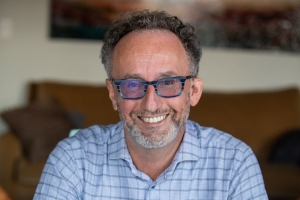
“The work we do as lawyers is based on humility — excellence through humility is important,” says Bruce McIvor, founder and partner at First Peoples Law LLP. At First Peoples Law, Bruce is dedicated to defending and advancing the rights of Indigenous peoples. Bruce, who is Métis, grew up in Manitoba. His family was displaced from their lands, leaving his grandparents to farm in between rocks and swamp. “When I was a young boy on the farm, I picked a lot of rocks, but I decided that there had to be something better to do than picking rocks for the rest of my life,” he recalls. “So that ultimately led me to law school, and to become a passionate advocate for Indigenous people. That's what motivates me.” Bruce’s decision to go to law school came about while he was completing his PhD in Environmental and Aboriginal history. Bruce had the good fortune to work with Louise Mandell, QC and Stuart Rush, QC on Indigenous rights litigation in Alberta and British Columbia. “Through working with them, I gained a better sense of the possibilities that exist working with the law,” he explains. It was this experience that led him to enroll in law school at UBC. Bruce describes going to law school as one of the best decisions he’s made, and says the experience far exceeded his expectations. Joining the Indigenous Law Students Association (ILSA) was a particularly meaningful part of his law school journey. “The ILSA was such a wonderful and supportive group of people — the staff, students, and professors all motivated me to do the best for Indigenous people,” he reflects. Bruce says that being part of ILSA taught him that the goal isn’t to be ultra-competitive, but to be an effective and compassionate lawyer. “The most valuable aspect of being an effective lawyer is the ability to collaborate, which was strengthened by my participation in ILSA,” he adds. As founder and partner at First Peoples Law, Bruce’s goal was to establish a law firm that’s founded on “compassion, empathy and collaboration,” and that’s just the type of law firm that he and his colleagues have built. “I really give thanks every day for the people that have joined me at First Peoples Law,” says Bruce. “They are such a wonderful, passionate group of people, both lawyers and non-lawyers,” he adds. In addition to his law practice, Bruce is an adjunct professor at the Allard School of Law, where he has taught the first-year course on Aboriginal and Treaty Rights, as well as an upper-level seminar course focused on Aboriginal law. “I love sitting around the table with students who are there by choice and motivated. They ask great questions,” he says. “I hope they come away from the class with a better understanding of the historical and political context of Indigenous rights and Aboriginal law in Canada.” Most importantly, Bruce hopes that his students come away from his classes with a passion for fulfilling their responsibilities to other lawyers and the public in educating people about the basis for Indigenous rights in Canada. When advising law students who are interested in pursuing a similar path, Bruce says that the key is to show that you’re passionate about defending Indigenous rights. “At my firm, we do what’s called, ‘commitment hiring.’ Everyone must have top-notch legal skills, but that by itself is not enough,” he explains. “You have to show that you are personally committed to the work we do… most of which is based on humility.” Bruce emphasizes that you can be an excellent lawyer and still be compassionate and humble. “It's important for law students and lawyers to always keep at the forefront, what a privileged position we have,” he says. “We have a responsibility and significant entitlement as lawyers, and it's an honor to represent our clients. It's always important to keep that in mind.” Bruce is a scholar, and has recently published a new book, titled, Standoff: Why Reconciliation Fails Indigenous Peoples and How to Fix It, which outlines the path forward for true reconciliation and the implementation of Indigenous rights. Among his arguments is the need for personal responsibility, in order to close the gap between the rhetoric of reconciliation and the reality that too many empty promises have been made. “People have personal responsibility to ask the difficult questions that need to be asked to hold politicians to account, and to demand the highest expectations of our politicians,” he says. In addition to his legal practice, teaching, research and writing, Bruce loves reading —particularly classic and modern literature. He also makes a concerted effort to carve out some space for himself and his family every day: “We put our devices away and focus, be present in the moment.”
First published on January 23, 2023.